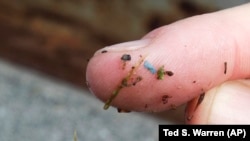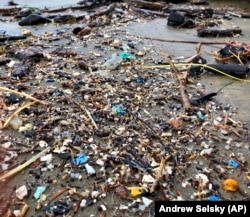Extremely small pieces of plastic called microplastics are in the ocean and the air, as well as in our food and water. Scientific study has discovered microplastics in human body tissues also, including the heart, liver and kidneys.
Some researchers worry that microplastics harm human health, although they say that science has not found clear evidence of that. Still, they say questions remain about the possible health effects of microplastics.
Manufacturers mostly use oil or other petroleum products to make plastic. The material is used to make a huge number of different products: water bottles, car parts, children’s playthings, clothing, electronics and more. Heat, weather, and even animal digestion break down plastic into smaller and smaller pieces.
Microplastics can be 5 millimeters long at most or as small as one micrometer. A micrometer is one-one thousandth of a millimeter. Microplastics have been found in salt, sugar, honey, rice and seafood. They have also been found in milk, soil, and drinking water.
Risks to the human body
Researchers disagree about how much plastic people might be breathing in or taking in as food and drink. Still, many studies find evidence of plastics in body tissues.
Tracey Woodruff is a researcher at the University of California at San Francisco. She said, “Microplastics have been measured in pretty much all of the body tissues that have been evaluated.”
Scientists are still trying to answer the question of how harmful microplastics might be. In 2022, a World Health Organization report found no clear risk to human health, based on the available evidence.
There is also not clear evidence of widespread public health effects.
However, researchers only recently began to measure plastic levels in the human body and learn about their possible effects. Woodruff of U.C. San Francisco said it makes sense that microplastics are harmful because they contain poisonous chemicals. The researcher was part of an investigative team that examined nearly 2,000 studies about microplastics at the request of California state lawmakers.
Some evidence suggests plastics can increase inflammation and other changes in the body. Such changes could increase the risk of heart attack and stroke.
Reducing exposure to microplastics
Researchers say there are ways to reduce possible contact with microplastics.
Take off your shoes before you go into your home. This helps prevent the spread of microplastics inside. Eat foods — especially fresh fruits and vegetables — that you prepare at home. Do not heat foods in plastic containers, Woodruff said. And, she added, use metal or glass water bottles, instead of plastic.
I’m Andrew Smith.
Mike Stobbe wrote this story for The Associated Press. Andrew Smith adapted it for VOA Learning English.
_______________________________________________
Words in This Story
digestion -n. the breaking down and absorption of food in the body
evaluate -v. to measure, judge, or analyze
inflammation -n. an increase in size of body tissues that results from infection, injury, or illness







Forum